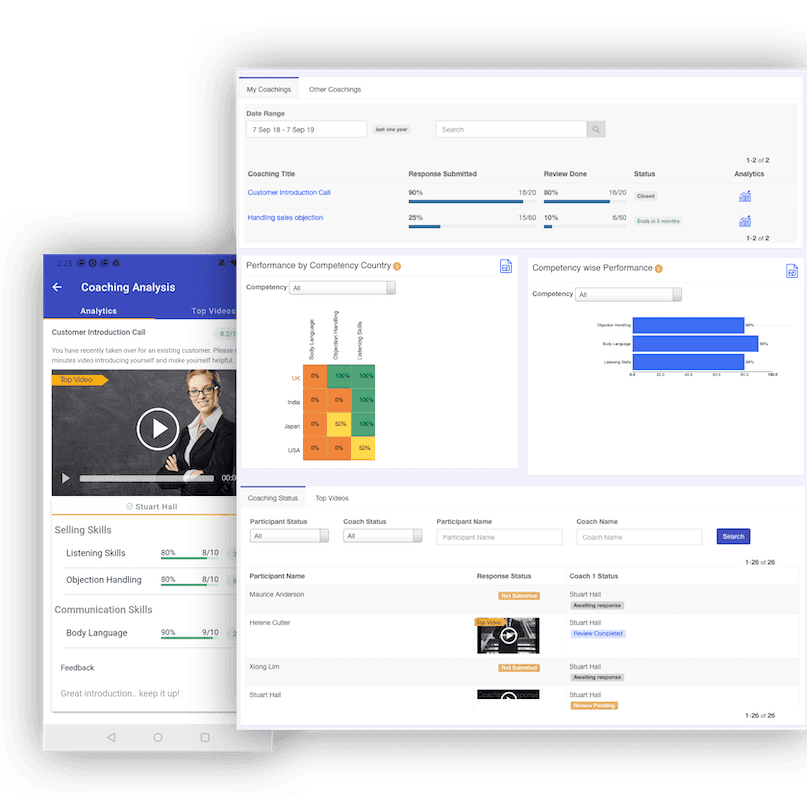Summary
Learn how to build a powerful sales coaching culture that boosts performance, strengthens skills, and drives long-term sales success.
You know how important a sales coaching program is for your organizational success. You have done a lot of research and decided on the business scenarios where you are going to use coaching to improve. You even studied up on the coaching best practices and feel pretty confident about the successful implementation of coaching at your organization.
Let’s just take a step back here and look at a critical thing that is left to be taken care of. Creating a committed and impactful sales coaching culture at your organization
This sounds easy, right? You might think all you have to do is put in your sales coaching program and the culture will develop around it by itself. Not so fast. All the best practices in the world won’t help you unless you have a dedicated sales coaching culture, where:
Every individual is fully bought-in
Every coach is empowered with the right coaching tactics
Every rep takes the responsibility of utilizing the coaching and improving their performance
To help you build a culture like this, we have put together some crucial aspects that all the best companies use to establish a strong coaching culture.
Creating Sales Coaching Culture
1. Create an effective coaching framework
This is the first step to implement an impactful sales coaching culture. An effective coaching framework lays the foundation for building a solid coaching culture. So, make sure that you create a good coaching framework and communicate it broadly to all the people who are going to be involved in the coaching.
Here is how to go about building a solid sales coaching framework
Set the Goal: Sit with the team of decision-makers and decide on the ultimate goal which you want to achieve through coaching. You may set a weekly goal, monthly goal, quarterly goal, or annual goal. For example, your goal might be to increase the number of deals that your reps close in a particular quarter. Define this goal clearly in your coaching framework so that it’s clear to everyone-- from the top management to the front-line sales reps.
Define KPIs: Break down the goal into smaller KPIs/ metrics/ behaviors. Progress in these metrics should ultimately lead to the achievement of the final goal. For instance, if your goal is to increase the number of deals that your reps close in a quarter then the KPIs should be:
Number of leads entered by a rep into the sales pipeline
The lead conversion rate etc
Make sure that you tie all your coaching efforts to these KPIs
Forms of Coaching: Use a combination of these two forms of coaching to increase the effectiveness of your coaching efforts.
Manager to rep: This is the famous, well-known form of coaching which takes place between the manager and his team of sales reps. This is one-side coaching where the manager coaches the reps and monitors their performance.
Peer to peer: This form of coaching facilitates peer-to-peer collaboration amongst the team members. Here you need to pair two sales reps as a team. Then, encourage them to:
Listen to each other call recordings or coaching videos
Grade each other’s performance
And give feedback to improve each other
This provides a safe and comfortable space for the reps to learn from their peers and improve their skills
Maintain Consistency in coaching: Make sure that the coaching happens regularly and consistently. Preferably once a week. Managers should ensure at least one coaching session per week for all the employees in their team.
2. Gain Buy-in from top to bottom
Once your coaching framework is ready, you need to gain buy-in not just from the front-line sales staff but also from the sales management and C-level executives. After all, you need their full support in order to be truly empowered with your sales coaching initiatives.
Let your Sales VP know that at least 25% of the day-to-day time of managers will be spent on this. And make sure they are OK with that.
3. Train the Coaches
Put together a manager training program where the front-line managers receive proper and consistent training from their managers to better themselves as coaches. This training should cover:
What questions the managers should ask during the coaching session
How to make the coaching session employee-led
How to extract various information from the employee
How to identify unique skill gaps of each employee and close them
How to customize the coaching for each role and performance level
Pro-tip: Make coaching the primary focus for your front-line sales managers. A lot of times sales managers primarily focus on closing deals or trying to close deals instead of trying to coach and improve their people. The reasons are time constraints, varying levels of skills amongst their team members, etc. Encourage them to take time for coaching by rewarding their coaching efforts. Every month, reward exciting prizes to managers who have consistently dedicated 25% of their working hours towards coaching their team. Also, reward those managers who have Improved their team’s performance exponentially through coaching Or have received good feedback from the trainees for their coaching
4. Ensure resources
Most people think of sales reps when considering the resources they need in sales coaching. In truth, it is sales managers that are typically most in need of these resources.
A sales manager’s day is cramped as it is with a lot of tasks. In the middle of juggling multiple things, it is difficult for them to be well-versed with all the nuances and best practices of sales coaching. So make sure that they have all coaching information and data at their fingertips.
Enable them with:
The training materials and a standard coaching template that teach how to coach
A tool that reinforces these lessons
And, the data regarding each reps’ performance
This helps them to drive the coaching on the right track without getting lost in search of the relevant data and information
5. Let employees lead the coaching
It’s crucial to let the employees lead the coaching conversation. This allows them to take ownership of their own learning and feel empowered.
Here how the managers can get their reps to take the lead in the coaching sessions:
Share the call recordings, demos, or coaching videos of the top reps with all the team members. Now ask the reps to listen and compare their calls with the top reps’ calls. Then they should come up with a list of things things that they need to work on to improve.
Another way to get your employees to lead the coaching is by asking these two crucial questions during the coaching session:
What went well?
What would you do differently?This prompts the reps to identify their skill gaps by themselves and speak about them
Once the reps say what is it that they want to work on, the managers can then pick one little part of it (one or two key improvement areas) and work with the reps to perfect them. Once that is improved they can then move on to the next key improvement area. This way, the improvement can be done one step at a time.
This kind of self-awareness liberates the reps to take control of their own learning.
Pro-tip: The managers/ coaches should lead the coaching conversation by mostly asking open-ended questions. This then lets the employees to talk them through the questions. The last question should always be “What else?”. This allows the employees to voice their opinion, queries, or discuss anything else that would like.
6. Keep the coaching simple and effective
Ask the coaches to give not more than 2 or 3 takeaways per coaching session. This is important because giving too many takeaways at the same time would overwhelm the employees.
As a result, they might get lost and fail to improve their performance
7. Gamify Sales Coaching
All these points above help you to form a good coaching culture. But to really strength your coaching culture you need to make sure that your reps receive it and utilize it well. One best way to ensure this is to add gamification to your coaching. You can add game elements like points, badges levels and prizes to motivate your reps to adopt coaching. This way you will be able to
Set a lite mood for the coaching
Pique your reps’ interest in learning and skill development
Get them to dance their way to coaching
8. Measure the coaching impact
Your job is not done by just establishing a strong coaching culture. You also need to frequently measure the impact of your coaching program and determining what is working and what is not. This helps you to identify any loopholes in your coaching program early on and fix them.
Here are some ways to measure the impact of your coaching efforts:
Measure the crucial metric/ metrics (using a platform) of the coaching program and see how much the reps have improved in it over a period of time. For example, if you have done coaching on discovery questions, then measure: How many discovery calls of each rep got converted to a second meeting in a span of 3 months
Extract regular feedback from the front-line sales managers about their training. Determine if they are being trained properly to be effective coaches
Put in place a sales advisory board where you talk to the front-line reps, once every month, in a manager-free zone. Here, you need to ask them
What do they think about their coaching sessions?
What are some problems?
What do they want attention paid to?
Take this feedback anonymously to the managers so that they know where their coaching needs improvement. This creates transparency which helps to put things on the right track if they go wrong
After every meeting, make sure that you survey both the coach and the rep about the coaching session.
From the coach, you want to know
How the sales rep has received the coaching?
What is his current level of skills and knowledge?
Is he likely to utilize coaching to improve himself?
From the sales rep, you want to know
How helpful he thought the coaching was for him?
How helpful was his coach?
Did the coaching session cover everything that he wanted?
Does he have an action plan after the coaching to improve his performance?
This survey helps you get the perspective of the manager as well as the employee.
Keep a track of each reps’ overall sales performance and see if each one is improving continuously.
9. Leverage coaching insights to drive employee performance
Now that you are coaching regularly and measuring its impact, you should be able to draw insights from the coaching data. These insights are extremely crucial. They help you get answers to some critical questions that you might have regarding your sales reps’ performance. And, you can use these insights to positively impact your employees’ performance.
Here’s how:
Graph the crucial metrics and keep a check on the progress of each rep. If you do not see any progress in a particular rep’s performance then you need to figure out if the rep isn’t using the coaching or if the coaching is poor.
One way to figure this out is by looking at the performance of all the reps under that manager. If you notice poor performance across the board then it’s probably an issue with the manager. If the issue is only with that one rep then dig in deeper by listening to the call recordings of the rep and analyze the core problem. Then provide your insights and findings to the rep and her manager and suggest a course of action to fix it.
Also, once someone is coached on a particular KPI, ask the managers to set up a tracker/ scorecard to track that rep’s performance in that particular KPI. If the manager sees no improvement then he needs to refocus on that rep and coach her further to close any knowledge or skill gaps.
For instance, if a manager coached a rep on Monday and listened to her call recordings throughout the week and nothing has changed, then he should have another meeting with the rep to reassess and discuss what can be done to uplift her performance.
Final Words: We hope these pointers come in handy for you to build a strong, impactful, reliable and meaningful sales coaching culture at your organization
Ready to build a sales coaching culture with real impact? Explore how Two-Way AI Role Plays can supercharge your efforts and drive results
Read: SmartWinnr Neo AI | AI Powered Sales Coaching
Looking for a Sales Coaching Playbook?
Sales Coaching PlayBook Part 1 - Competency Framework
Sales Coaching PlayBook Part 2 - Training the managers to Coach
Sales Coaching Playbook Part 3- How to Measure Success of Coaching
Looking for a platform to drive your sales coaching virtually?
Learn about the 7 Features that you absolutely need to have in your Video Coaching Platform
Hear what our clients have to say about their experience with SmartWinnr’s Video Coaching
Want to know how to coach your sales people into sales champions?
How to coach your salespeople into sales champions
Want to know how to deliver an innovative coaching program in 2021?
Read: Delivering Innovative coaching programs in 2021
SmartWinnr: Best in Sales Coaching
Improve call effectiveness of your sales team with our field coaching, video-based coaching, practice and assessment. SmartWinnr’s video coaching is being used today by some of the top companies like Boston Scientific to coach and mentor their sales team to peak performance.

Want to see if SmartWinnr is a right fit for your team and your coaching needs? Book a free consultation with us today!
Related Posts
Looking for a sales training software that takes your sales training to a whole new level?
Explore SmartWinnr’s Learning and Gamification features. Learn how to run fun and engaging sales training and sales coaching for your team through SmartWinnr.
Curious to learn more about it? Book a demo today!








